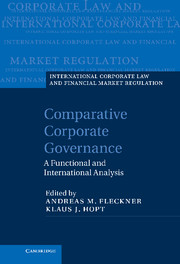Book contents
- Frontmatter
- Contents
- Contributors
- Preface
- Abbreviations
- Part I General report
- Part II National reports
- A Australia and Asia
- B Europe
- 6 Austria
- 7 Belgium
- 8 Denmark
- 9 Finland
- 10 France
- 11 Georgia
- 12 Germany
- 13 Hungary
- 14 Luxembourg
- 15 Netherlands
- 16 Norway
- 17 Poland
- 18 Portugal
- 19 Spain
- 20 Switzerland
- 21 United Kingdom
- C The Americas
- Part III Annex: Questionnaire
- Index
- References
16 - Norway
Corporate governance on the outskirts of the EU
from B - Europe
Published online by Cambridge University Press: 05 July 2013
- Frontmatter
- Contents
- Contributors
- Preface
- Abbreviations
- Part I General report
- Part II National reports
- A Australia and Asia
- B Europe
- 6 Austria
- 7 Belgium
- 8 Denmark
- 9 Finland
- 10 France
- 11 Georgia
- 12 Germany
- 13 Hungary
- 14 Luxembourg
- 15 Netherlands
- 16 Norway
- 17 Poland
- 18 Portugal
- 19 Spain
- 20 Switzerland
- 21 United Kingdom
- C The Americas
- Part III Annex: Questionnaire
- Index
- References
Summary
Introduction
This chapter gives an overview of the regulation of corporate governance in Norway, indicating also, to a certain extent, the practice related to and the effect of the regulation. The section following this introduction includes an overview of relevant acts and other sources of law. The main emphasis is on the third section, which focuses on the internal balance between the company organs, notably the composition of the different organs, the independence of directors, and shareholders' rights and obligations. The fourth section focuses on external corporate governance, mainly the regulation of takeovers, whereas sections five and six give a brief overview on enforcement and recent development regarding reporting on corporate social responsibility.
General information on corporate governance
Definition of corporate governance
There is no definition of corporate governance in Norway as a matter of law. The dominant corporate governance code (The Norwegian Code of Practice for Corporate Governance [“The Corporate Governance Code”]) does not expressly define the term either, but an indication is given of the understanding of the concept through the issues with which the code deals. The focus is on the relationship between the shareholders and the board. This is confirmed through the objective of the Corporate Governance Code, which is given as promoting companies' practice of corporate governance that regulates the division of roles between shareholders, the board of directors, and executive management more comprehensively than is required by legislation.
- Type
- Chapter
- Information
- Comparative Corporate GovernanceA Functional and International Analysis, pp. 702 - 752Publisher: Cambridge University PressPrint publication year: 2013
References
- 2
- Cited by

